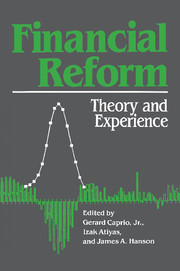Crossref Citations
This Book has been
cited by the following publications. This list is generated based on data provided by Crossref.
Munasinghe, Mohan
1999.
Is environmental degradation an inevitable consequence of economic growth: tunneling through the environmental Kuznets curve.
Ecological Economics,
Vol. 29,
Issue. 1,
p.
89.
Choi, Chong Ju
and
Millar, Carla C. J. M.
2000.
International Business.
p.
44.
Scholtens, Bert
2000.
Financial regulation and financial system architecture in Central Europe.
Journal of Banking & Finance,
Vol. 24,
Issue. 4,
p.
525.
Hermes, Niels
and
Lensink, Robert
2000.
Financial system development in transition economies.
Journal of Banking & Finance,
Vol. 24,
Issue. 4,
p.
507.
Eichengreen, Barry
2000.
Taming Capital Flows.
World Development,
Vol. 28,
Issue. 6,
p.
1105.
Ciancanelli, Penny
and
Reyes-Gonzalez, Jos� Antonio
2000.
Corporate Governance in Banking: A Conceptual Framework.
SSRN Electronic Journal ,
Pettman, Barrie
Nsouli, Saleh M.
Rached, Mounir
and
Funke, Norbert
2005.
The speed of adjustment and the sequencing of economic reforms.
International Journal of Social Economics,
Vol. 32,
Issue. 9,
p.
740.
Ameer, Rashid
2013.
Financial liberalization and firms’ capital structure adjustments evidence from Southeast Asia and South America.
Journal of Economics and Finance,
Vol. 37,
Issue. 1,
p.
1.
Panda, Debadutta
and
Reddy, Sriharsha
2016.
Resource based view of internationalization: evidence from Indian commercial banks.
Journal of Asia Business Studies,
Vol. 10,
Issue. 1,
p.
41.
Chaluvadi, Sashank
Raut, Rakesh
and
Gardas, Bhaskar B.
2018.
Measuring the performance efficiency of banks in a developing economy.
Benchmarking: An International Journal,
Vol. 25,
Issue. 2,
p.
575.





